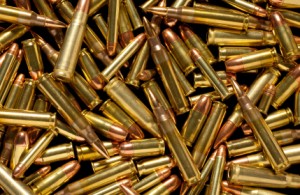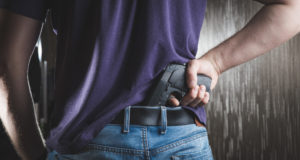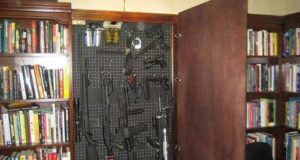 The type of ammo you choose to use, whether for practice or self-defense, can and will vary depending on the situation and your budget. For many of us who shoot a great deal, the ideal solution is reloading our ammo for practice, hunting, and, in some cases, for our defense; however, the latter may not be advisable in many circumstances, at least not legally.
The type of ammo you choose to use, whether for practice or self-defense, can and will vary depending on the situation and your budget. For many of us who shoot a great deal, the ideal solution is reloading our ammo for practice, hunting, and, in some cases, for our defense; however, the latter may not be advisable in many circumstances, at least not legally.
For many years now, I have been a heavy user of my Dillon Reloader, mostly for handguns used in defensive classes as well as hunting ammo. Many times I have shot anywhere from 1,500 to 3,000 rounds per week. If I had used store-bought ammo, even the cheaper foreign variety, it still would have cost me a bundle of cash. Reloading is the best way to practice with your firearm; the rounds may not meet “factory specs,” but they are still good practice rounds. In some cases with extremely experienced reloaders, accuracy with these rounds can and often is better than factory rounds.
Now, it’s understandable that everyone isn’t in a position to reload their own ammunition, and in many cases, too leery to do so. It is a dangerous “hobby,” one that can cause loss of fingers, hands, eyes, and life. The commitment to reload is one that requires your full attention, and caution at all times while working. Ask anyone who has been on the range and either they or someone else has fired a reload, loaded with a double shot of powder. Standing nearby when a gun explodes is not a enjoyable experience, but it is one that will stay with you forever.
One last bit of advice about reloading ammo for self-defense. It is not advisable, and pretty much not necessary in most experts’ opinion. The personal defense ammunition out there today is made to protect you, as well as the innocent bystanders or neighbors on the other side of the wall. Using a heavy load that you personally developed for defense and using that round to defend yourself can work against you in a court of law. It is well worth your checking into your local, state, and federal laws on this before you decide to take this road.
There are many shooters out there that don’t choose to reload, and there is an abundance of cheaper ammo for sale today for practice. Wolf, American Eagle, and the many online companies offering GI ammo cans of ammo are just a few. While these are all well and good for practice, before you load your handgun for personal defense or your rifle for hunting, you should always fire and sight in using the best factory ammo available. This is when accuracy counts—either taking that shot at a trophy elk or having one opportunity to make a shot that could save your or another’s life. The extra few cents spent on that round can make all the difference in the world.
In my experience and that of many others out there, we have found that every handgun and many rifles fire different patterns with different ammunition. If you are interested in the accuracy of your firearm, then getting multiple manufacturers ammo of the same weight and firing under ideal rest position should show you which ammo shoots the best pattern for that weapon. This is something that is constantly done by the professional shooter, who you can always find on the range, many times loading individual rounds one at a time. Using different powder, primers, casings, and bullet weights will affect every shot differently with an individual firearm.
Keep Your Handgun Locked and Loaded, Ready For Instant Use – Without Fear Of An Accident!
It should go without saying that your ammunition should be kept in a dry, warm, and secure place. As Oliver Cromwell advised his troops, “Put your trust in God, but mind to keep your powder dry.” It is advisable to keep a good rotation of ammo, which also keeps you practicing—a good thing indeed. Watch your rounds for age and rust signs, and if you find any, discard the rounds properly. For storage, those military metal ammo cans that you find at swap meets, gun shows, or online are excellent. That’s what they were made for.
If you are one of many of us who are prepared for the event of a home invasion, ammo is of a major concern. Of course you will want magazines handy, but always keep in mind that you may be moving about the house or to an outbuilding, barn, or shop. The average armed citizen will carry his firearm to town, but they rarely have a spare clip or speed loader on their person. The same thing happens in the home. You see it on TV and in movies all the time—picking up the handgun from the nightstand, or better yet, from inside the locked pistol safe in the bedroom, and heading out to find the burglar (which is the wrong move, by the way). There is never extra ammo present. This is something you should think about and plan ahead. In all probability, a gun battle with multiple assailants will last longer than the six rounds in your revolver.
Now a comment about loaded firearms for protection. It is your personal choice to keep your defense weapon loaded or not. For safety reasons, whether it be because of children or a lack of experience with the weapon, many citizens don’t load the firearm they have in the home for self defense. I would say to those people, that is fine, but make sure you practice often, loading that firearm quickly, in the dark, and have that magazine or speed loader handy. You ask why in the dark? It’s really easy for someone to cut your power, and if you are sleeping, you won’t know it until the first sound awakes you.
The old saying that an unloaded gun is just a club rings true to many. The quality and safety conditions of firearms today, tethered to professional training and practice, ensures your safety and readiness to defend. If you are licensed to conceal carry in your state, the holsters available to you ensure in most cases that there cannot be an accidental discharge. That being said, however, accidents can and will happen, so it is a very serious decision to carry. Revolvers that don’t have safety features can have a strap over the trigger, or some are hammerless. And, you always have the option of keeping the cylinder empty under the trigger, with maybe a $20 bill rolled up in it like the early gunfighters. Remember, five rounds are better than none.
©2012 Off the Grid News
 Off The Grid News Better Ideas For Off The Grid Living
Off The Grid News Better Ideas For Off The Grid Living




